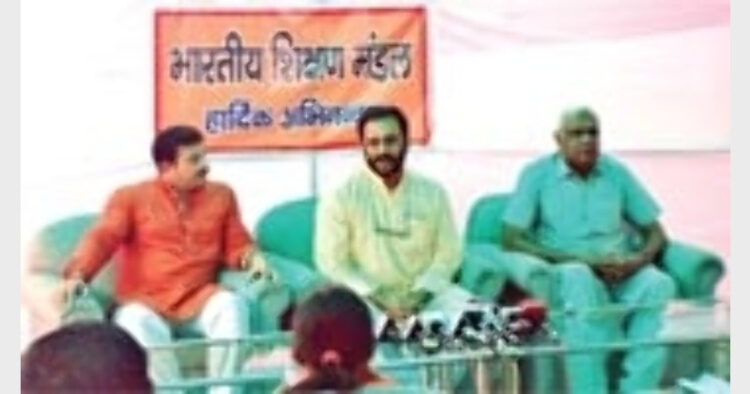Bharatiya Shikshan Mandal, the country’s premier organisation dedicated to rejuvenating Indian education system has come out with a comprehensive policy draft suggesting changes in country’s education policy. Before presenting it to the states and the Central government, feedback from educationists and general public is being sought on the draft through a nationwide campaign from July 7 to 19.
| Bharatiya Shikshan Mandal releases Policy Draft on Education |
Briefing the media in New Delhi on July 8 on it, joint organising secretary of the Shikshan Mandal Shri Mukul Kanitkar said the draft has been prepared keeping in view the holistic development of an individual. He said in spite of acquiring highly expensive education the youth are afflicted with problems like disappointment due to unemployment. Moreover, the contemporary education has drifted far away from values of life.
“Bharatiya Shikshan Mandal strives to develop an educational system which is based on the Bharatiya values enshrined in the manifestation of the ancient Bharatiya ethos and bring about the resurgence of the motherland. The Mandal prepared a questionnaire and made efforts to reach 4,000 educationists and teachers all over the country. A model of the indigenous model of Bharatiya education, ‘Bharatiya Shikshan Rooprekha’ was prepared by compiling the suggestions. The model was presented to all the people associated with education. A campaign consisting of workshops, seminars for bringing for exchange of ideas, is also going on,” he said.
He said the draft lays emphasis on the moral and integral development of students, which is facilitated by the preference to practical training in the eight year duration of elementary or general school education. The syllabus should be related to life, and methodology enjoyable. The draft proposes a flexible pattern of higher school education. A part of students be allowed to go for skill and vocational education by way of it is and specially designed Rural skill institutes. These students may further their studies in polytechnics and then some may join professional colleges. Even for the drop outs, who join some work after class 8 and want to go for higher school education after a year or two, the draft provides for a bridge course followed by regular school without any loss of years. The need to make the four year school education more pragmatic has been stressed upon. It has been emphasised that vocational subject and one classical language should be made compulsory in higher school i.e. from class 9 to 12. Choice of other three subjects be kept fully optional from a large list of more than 100 subjects. Cross disciplinary selection may be allowed. The proposed structure is fully flexible.
He said the university education should be made completely autonomous, the number of libraries and laboratories be increased, work experience be emphasised so as to enhance the work culture. Arrangements should be made for improving the performance in all the exams and preference should be given to research and writing thesis right from the graduation level. There should be multiple entry and exit options in the Higher Education. Certificate can be given to those students who discontinue studies after first year in the same way diploma after two years and pass degree after three years of University Education and honours degree after four years.
Shri Kanitkar said emphasis has been placed on acquiring efficiency in vocational skills in professional education and hence every student should compulsorily work for two hours every day. The major part of the training should be based on practical experience and substantial improvements need to be effected in the evaluation procedures and system of examinations. There should not be any exams in classes 1 and 2, only oral exams in classes 3 and 4, written exams in classes 5 and 6, practical exams in classes 7 and 8, exams based on internal monthly tests and annual exams in classes 9 and 10. The weightage of the internal and the external exams should be in the ratio of 40:60. The evaluation in the internal exam should be on the basis of the class work, homework, practical knowledge and work experience. The system of pass/fail should be abrogated and anyone scoring at least 50 per cent marks should be eligible for being promoted to the higher class. The facility for improving the performance should be implemented.
(July 19, 2015 Page : 51)













Comments